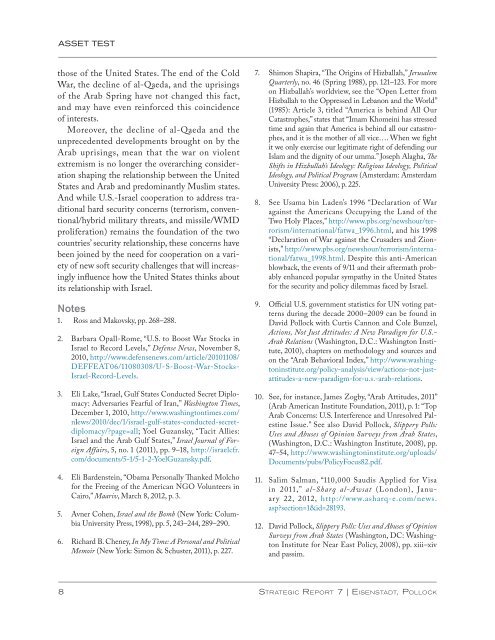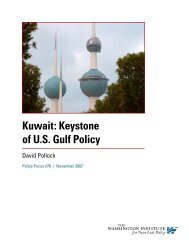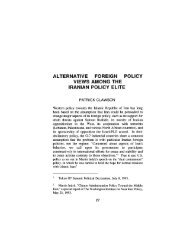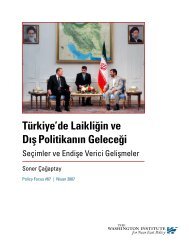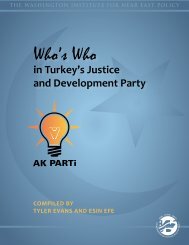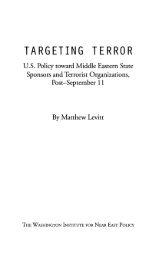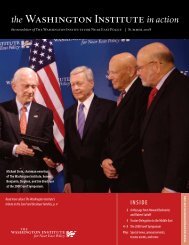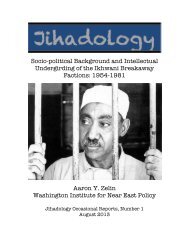ASSET TEST those of <strong>the</strong> <strong>United</strong> <strong>States</strong>. The end of <strong>the</strong> Cold War, <strong>the</strong> decline of al-Qaeda, and <strong>the</strong> uprisings of <strong>the</strong> Arab Spring have not changed this fact, and may have even reinforced this coincidence of interests. Moreover, <strong>the</strong> decline of al-Qaeda and <strong>the</strong> unprecedented developments brought on by <strong>the</strong> Arab uprisings, mean that <strong>the</strong> war on violent extremism is no longer <strong>the</strong> overarching consideration shaping <strong>the</strong> relationship between <strong>the</strong> <strong>United</strong> <strong>States</strong> and Arab and predominantly Muslim states. And while U.S.-Israel cooperation to address traditional hard security concerns (terrorism, conventional/hybrid military threats, and missile/WMD proliferation) remains <strong>the</strong> foundation of <strong>the</strong> two countries’ security relationship, <strong>the</strong>se concerns have been joined by <strong>the</strong> need for cooperation on a variety of new soft security challenges that will increasingly influence how <strong>the</strong> <strong>United</strong> <strong>States</strong> thinks about its relationship with Israel. Notes
13. National U.S.-Arab Chamber of Commerce, “2011 Trade Data: Preliminary Information,” February 15, 2012, http://www.nusacc.org/2011prelim. 14. <strong>Pollock</strong>, Slippery Polls, pp. xiii–xiv and passim. 15. Mark Landler and Steven Lee Meyers, “With $30 Billion Arms Deal, U.S. Bolsters Saudi Ties,” New York Times, December 29, 2011, http://www.nytimes. com/2011/12/30/world/middleeast/with-30-billionarms-deal-united-states-bolsters-ties-to-saudi-arabia. html; Will Lester, “U.S. Seals Deal on $3.48 Billion Sale of Missiles, Technology to UAE, a Close Ally in Mideast,” Associated Press, December 30, 2011, http:// www.boston.com/business/articles/2011/12/30/us_ seals_348b_missiles_technology_sale_to_uae/; Robert Burns, “U.S. Quietly Expanding Defense Ties with Saudis,” Associated Press, May 19, 2011, http://articles. boston.com/2011-05-19/news/29561404_1_saudi-arabia-saudis-fear-security-force. 16. <strong>Pollock</strong>, Slippery Polls, passim, and <strong>Pollock</strong> et al., Actions, Not Just Attitudes, passim. 17. <strong>Pollock</strong> et al., Actions, Not Just Attitudes, passim. 18. <strong>Pollock</strong>, Slippery Polls, pp. xiiii–xiv and passim. 19. <strong>Pollock</strong>, Slippery Polls, passim. 20. See, for instance, “On Anniversary of bin Laden’s Death, Little Backing of al-Qaeda” (Pew Global Attitudes Project, April 30, 2012), http://www.pewglobal.org/2012/04/30/on-anniversary-of-bin-ladensdeath-little-backing-of-al-qaeda/; “Osama bin Laden Largely Discredited among Muslim Publics in Recent Years” (Pew Global Attitudes Project, May 2, 2011), http://pewresearch.org/pubs/1977/poll-osama-binladen-death-confidence-muslim-publics-al-qaedafavorability. 21. <strong>Pollock</strong>, Slippery Polls, passim. 22. James R. Clapper (director of national intelligence), “Unclassified Statement for <strong>the</strong> Record on <strong>the</strong> Worldwide Threat Assessment of <strong>the</strong> U.S. Intelligence Community for <strong>the</strong> Senate Select Committee on <strong>How</strong> <strong>the</strong> <strong>United</strong> <strong>States</strong> <strong>Benefits</strong> from Its Alliance with Israel Intelligence,” January 31, 2012, http://www.fas.org/irp/ congress/2012_hr/013112clapper.pdf. 23. Shlomo Shpiro, “Israeli Intelligence and al-Qaeda,” International Journal of Intelligence and Counter Intelligence 25, no. 2 (2012), pp. 242–243, 249, 255; Lake, “Israel, Gulf <strong>States</strong>”; Guzansky, “Tacit Allies.” 24. Jeremy M. Sharp, U.S. Foreign Aid to Israel, Congressional Research Service Report RL33222 (March 12, 2012), p. 24, http://www.fas.org/sgp/crs/mideast/ RL33222.pdf. 25. Jeremy M. Sharp, U.S. Foreign Assistance to <strong>the</strong> Middle East: Historical Background, Recent Trends, Congressional Research Service Report RL32260 ( July 17, 2009), p. 3, http://pdf.usaid.gov/pdf_docs/PCAAB954.pdf. 26. Ironically, some critics assert that Israel does not contribute to U.S. power-projection capabilities in <strong>the</strong> region. In fact, it is Israel’s military capabilities that obviate <strong>the</strong> need for U.S. power projection in <strong>the</strong> Levant, while <strong>the</strong> weakness of U.S. allies in <strong>the</strong> Gulf creates <strong>the</strong> need for U.S. power projection <strong>the</strong>re. Thousands of U.S. lives would have been spared and trillions of dollars saved if America’s Arab Gulf allies had been able to deter or defend <strong>the</strong>mselves against wouldbe regional hegemons. For one critic’s view, see, for instance, Chas Freeman, “Israel Is Useless to U.S. Power Projection,” Mondoweiss, April 30, 2010, http://mondoweiss.net/2010/04/freeman-israel-is-useless-to-uspower-projection.html. For one attempt to estimate <strong>the</strong> amount spent by <strong>the</strong> <strong>United</strong> <strong>States</strong> to secure Persian Gulf oil, see Roger J. Stern, “<strong>United</strong> <strong>States</strong> Cost of Military Force Projection in <strong>the</strong> Persian Gulf, 1975–2007,” Energy Policy 38, no. 6 ( June 2010), pp. 2816–2825, http://www.princeton.edu/oeme/articles/US-miiltarycost-of-Persian-Gulf-force-projection.pdf. 27. ASDA’A Burson-Marsteller Arab Youth Survey 2012, http://www.arabyouthsurvey.com/english/press_ release.php. 28. <strong>Michael</strong> Singh, “What Has Really Changed in <strong>the</strong> Middle East?” ForeignPolicy.com, September 22, 2011, http://shadow.foreignpolicy.com/posts/2011/09/22/ what_has_really_changed_in_<strong>the</strong>_middle_east. The WashingTon insTiTuTe for near easT Policy 9
- Page 1: A WASHINGTON INSTITUTE STRATEGIC RE
- Page 4 and 5: All rights reserved. Printed in the
- Page 7: About the Authors MICHAEL EISENSTAD
- Page 11 and 12: Executive Summary THE U.S.-ISRAEL s
- Page 13 and 14: al-Qaeda affiliates—and Israeli i
- Page 15 and 16: iomedical devices and instruments,
- Page 17 and 18: alliance with Israel—because it i
- Page 19 and 20: 1 | Introduction THE U.S.-ISRAEL sp
- Page 21 and 22: 2 | The Enduring Strategic Logic U.
- Page 23 and 24: 5 4 3 2 1 0 5 4 3 2 1 0 sales of U.
- Page 25: Furthermore, under U.S. law, Israel
- Page 29 and 30: network of the Popular Front for th
- Page 31 and 32: Israel’s rocket and missile defen
- Page 33 and 34: characterized by a campaign of suic
- Page 35 and 36: May 2011 raid to kill Usama bin Lad
- Page 37 and 38: To deal with these U.S. apprehensio
- Page 39 and 40: security technologies, including bo
- Page 41 and 42: August 25, 2008, http://www.nytimes
- Page 43 and 44: RAND_OP335.pdf. U.S. forces sometim
- Page 45 and 46: And according to former Joint IED D
- Page 47 and 48: www.emsworld.com/article/10321585/p
- Page 49 and 50: compared to that of the United Stat
- Page 51 and 52: How the United States Benefits from
- Page 53 and 54: every aspect of modern life on comp
- Page 55 and 56: with a number of other countries, i
- Page 57 and 58: food security goals in Africa and e
- Page 59 and 60: emergency services use a novel Isra
- Page 61 and 62: public’s faith in the government
- Page 63 and 64: 27. Omand, Securing the State, pp.
- Page 65 and 66: 2009, http://www.haaretz.com/print-
- Page 67 and 68: also Sharon Udasin, “GE Awards Is
- Page 69 and 70: 5 | Future Challenges ISRAEL IS A S
- Page 71 and 72: Democrats stated that their sympath
- Page 73 and 74: could undercut Israel’s appeal as
- Page 75 and 76: 6 | Conclusion ISRAEL IS A SMALL CO
- Page 78:
The Washington Institute for Near E


